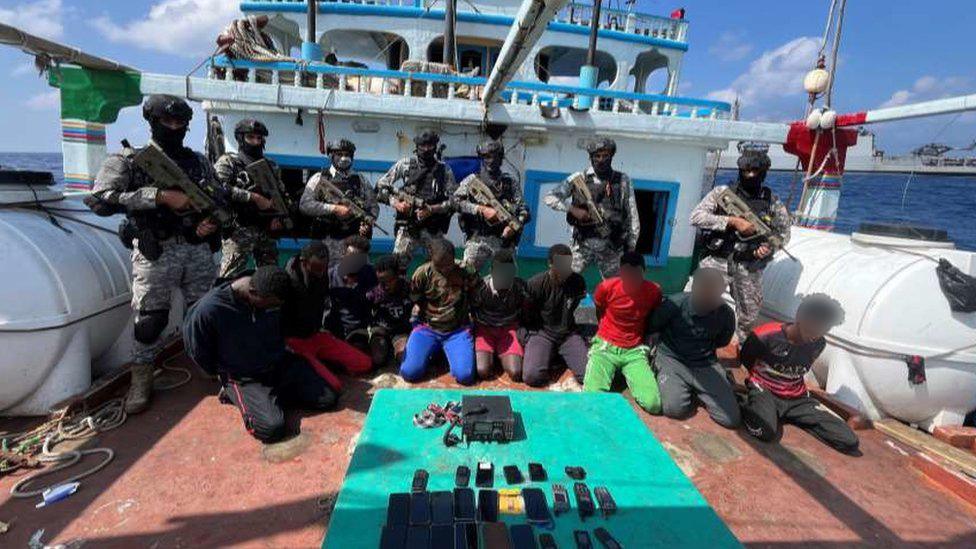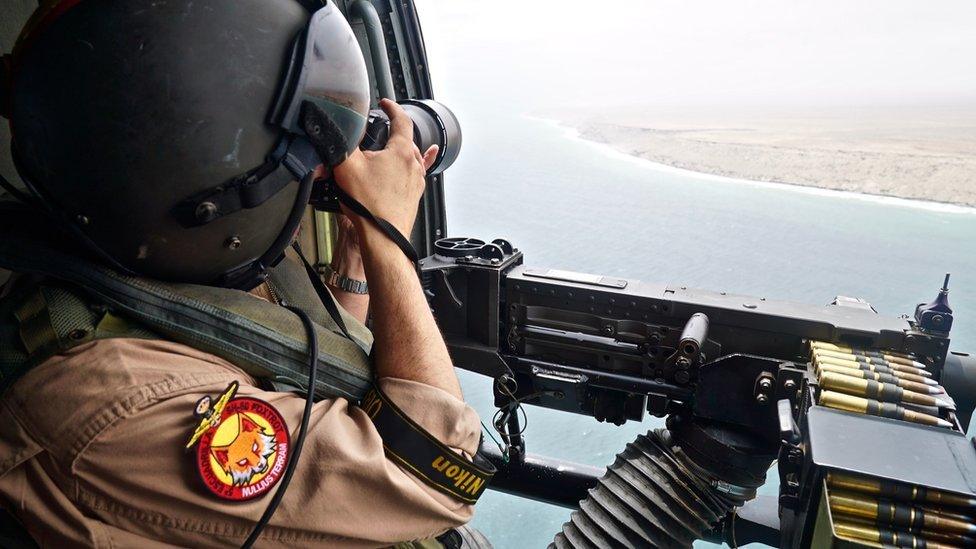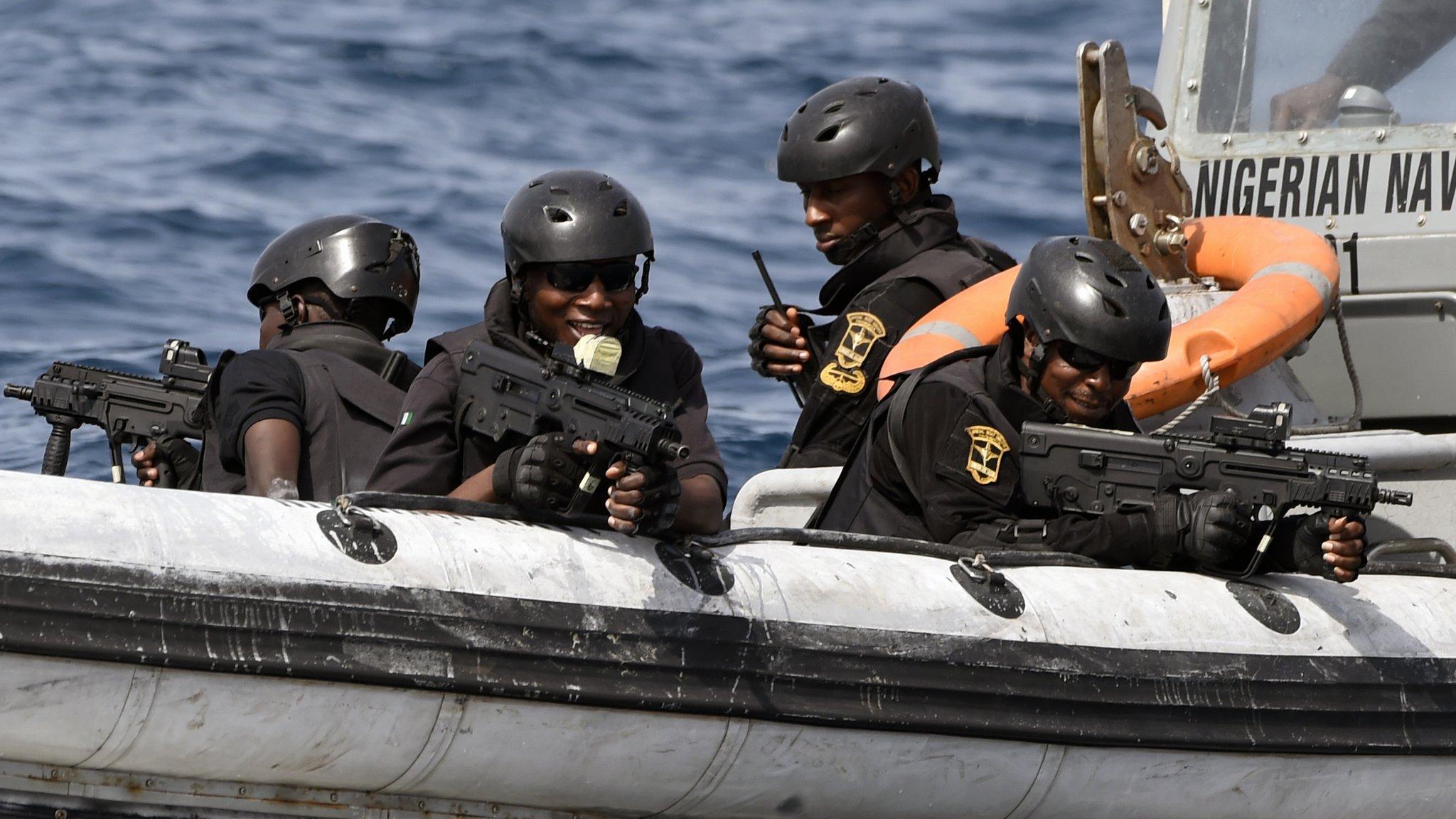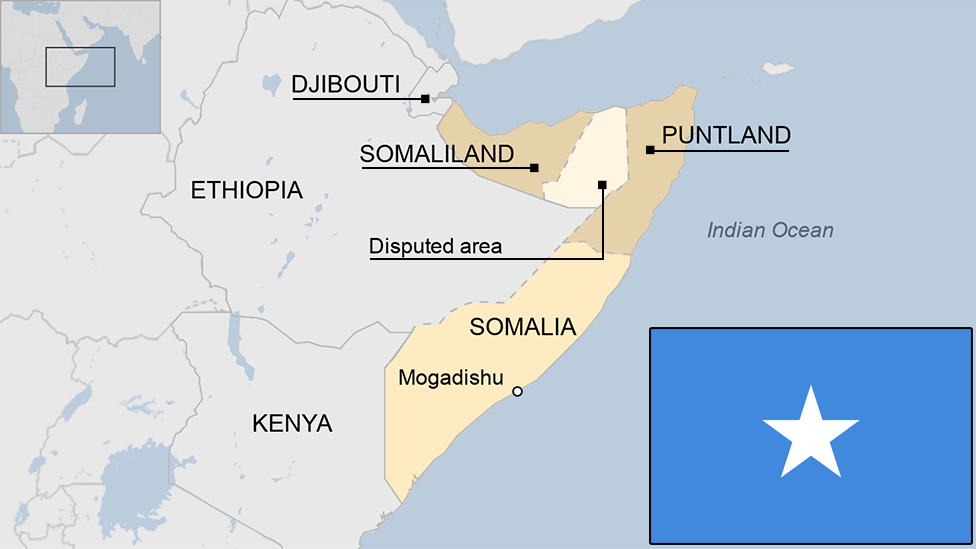Somalia piracy: Are we witnessing its return off the country's coast?
- Published

The Indian Navy posted a photo of its personnel with the captured hijackers
Hijackers are once again targeting ships off Somalia's coast and a recent spike in attacks has brought back memories from more than a decade ago.
That was when armed Somali pirates scoured the waters, forcefully boarding vessels and raking in millions of dollars by demanding ransoms.
That died down and all but disappeared once extensive security measures were put in place, but the events from the past few weeks has raised questions about whether a full-scale resurgence of piracy is possible.
What attacks have happened recently?
According to EUNavfor Atalanta, external, a European Union naval force responsible for maritime security along East Africa's coast, at least 14 vessels have been hijacked off the Somali coast since late November.
These include two in that month when an Iranian-flagged fishing boat was attacked and then two days later a Liberian-flagged ship, Central Park, was targeted. In both cases the crews were rescued.
US forces were involved in the Central Park rescue and later said the attackers were likely Somali and that it was "clearly a piracy-related incident".
Then in December the MV Ruen, a ship carrying a Maltese flag, was hijacked. The attackers are still in control of the vessel and 17 crew members remain stuck on board. This was the first successful hijacking off Somalia in six years, according to the International Maritime Bureau (IMB), an influential non-profit organisation that aims to tackle maritime crime.
In January, attacks continued with the Indian navy coming to the aid of the sailors in several cases including three this week. On Friday it said it freed 19 crew members - 11 Iranians and eight Pakistanis - "who had been held captive by the Somali pirates".
What has triggered these hijackings?
Attacks on ships off Somalia appear to be opportunistic, with hijackers likely exploiting a security gap, Troels Burchall Henningsen, associate professor at the Royal Danish Defence College, told the BBC.
International forces began patrolling these waters when piracy surged between 2005 and 2012, but the focus recently moved up into the Red Sea, where Yemen's Houthi rebel group have been attacking ships, he said.
"Militarily speaking, it is such a demanding task to protect against [the Houthis'] missiles and drones. So they're not able to switch between anti-piracy and encountering drones and missiles," Dr Henningsen explained.
This theory has been echoed by the Indian Ocean Commission (IOC), a regional body comprised of countries in nearby East African waters, like the Seychelles and Comoros.
In a statement last week, the IOC suggested other reasons for the hijacking spike.
In the initial wave of attacks over a decade ago, some coastal fisherman turned to piracy after their livelihoods were destroyed by illegal fishing from foreign trawlers.
The IOC said current Somali fishery policy has led to another increase in foreign fishing vessels, which may again be pushing coastal Somalis into piracy.
The IOC also referenced speculation that the Islamist militant Somalia-based al-Shabab group has been encouraging attacks on ships, via an alleged deal where they get a cut of ransom proceeds in exchange for providing the attackers with protection.
What do the hijackers want from the ships?
Between 2005 and 2012, pirates off the Horn of Africa raked in between $339m (£266m) and $413m (£325) by holding crew members hostage and demanding ransom payments, the World Bank has estimated.
Given this history, Samuel Oyewole, a lecturer at Nigeria's Federal University with an expertise in East African piracy, said that the latest set of hijackers are highly likely to be after ransoms.
But at this stage it is not possible to know for sure, Mr Oyewole said.
"In most cases... the efforts of the multinational naval forces in the region actually disrupted the operations.
"So at the end of the day, we may not fully know the intention," he explained.
What has been the reaction to the attacks?
The IOC called the situation "worrying" in its statement, going so far as to urge a UN-appointed anti-piracy group to "asap" hold an emergency meeting about the attacks.
The IMB called the the MV Ruen - which has been under the control of hijackers since 14 December - a "cause for concern".
IMB Director Michael Howlett told the BBC that "every successful hijacking" has the potential to encourage others to carry out attacks.
Although the assaults have caused concern within the commercial shipping industry, that concern is being "overshadowed", Dr Henningsen said.
"They are, of course, most worried about the incidents in the Red Sea because it's on a much larger scale and potentially much more dangerous."
Does this indicate a resurgence of Somali piracy?
The IOC said it considers at least six of the recent attacks to be acts of piracy.
When asked by the BBC how it designated the assaults of the past couple of months, the IMB said "the attacks on merchant ships are classified as piracy".
And on Tuesday EUNavfor Atalanta said the outcome of the seizing of the MV Ruen could determine whether the region will see a "resurgence".
Amid media reports that the ship's captors are demanding a ransom, EUNavfor, external Atalanta said the MV Ruen served "as a test to determine if piracy remains a profitable".
"Should piracy prove lucrative in this instance, the conclusion of the monsoon season may herald a resurgence in pirate activities," it continued.
However, Dr Jess Simonds, who specialises in the Horn of Africa's maritime security at the UK's University of Chester, argued that the recent hijackings must be treated on a case-by-case basis
She pointed out that according to a UN definition, external, piracy takes place on the high seas, i.e. waters that are outside any country's jurisdiction. Half of the recent hijackings recorded by EUNavfor Atalanta have occurred in Somalia's territorial waters.
"What can become quite dangerous is that any attack at sea, because it's off Somalia, can be considered piracy," Dr Simonds said.
Meanwhile, both Dr Henningsen and Dr Oyewole believe that although international naval forces in the region may be stretched by the Houthi attacks, they are currently still capable of preventing a full-scale return to the piracy of the past.
What is being done to combat the assaults?
EUNavfor Atalanta said it is "monitoring all suspected cases of piracy" and "together with its maritime security partners deployed in the area and the naval forces of regional countries, remains fully committed to not allowing the resurgence of this threat".
EUNavfor and other forces, for example from India and the US, have successfully foiled many attacks.
But, the IOC complained that EUNavfor "currently runs on a single ship by the Spanish navy" and that "except for the Indian navy, naval forces that actively contribute to counter-piracy have been substantially reduced".
Dr Oyewole told the BBC that in seeking to tackle attacks off Somalia, the international community should look to two geopolitical conflicts.
He noted that the Houthi rebels say they will stop attacking ships - and therefore drawing naval patrols from off Somalia - once Israel stops its war on Gaza. Secondly, Somalia is currently in a diplomatic row with the self-declared republic of Somaliland and Ethiopia over a controversial port deal, and any escalation may leave it less able to police piracy.
"These are issues that the international community have to pay attention to before it gets to a point where it threatens the whole," Dr Oyewole said.
Related topics
- Published11 December 2018

- Published19 June 2019

- Published2 January 2024
